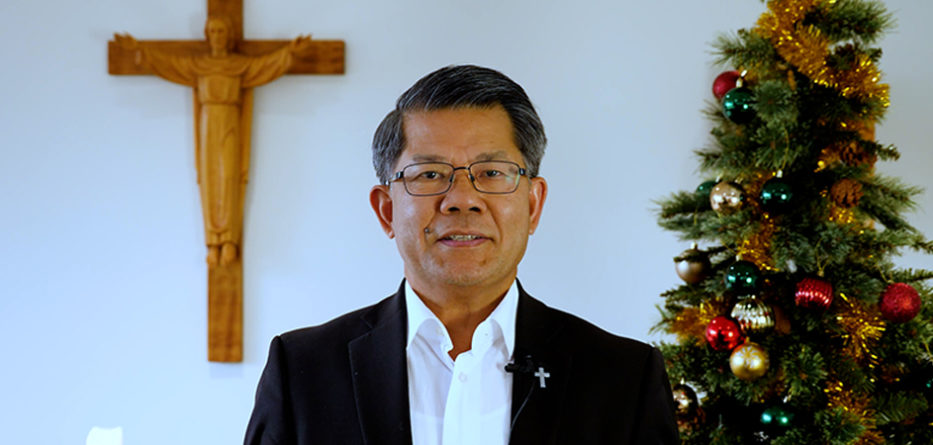Most Reverend Vincent Long Van Nguyen OFM Conv DD STL, Bishop of Parramatta
Homily for Christmas Eve
Readings: Isaiah 9:1-7; Titus 2:11-14; Luke 2:1-20
Christmas is a season of hope and joy. Yet there has not been a lot of hope and joy for us, it seems. With the constantly mutating virus and its ability to wreak havoc, we realise that we are only as strong as our weakest links. Pope Francis is so prescient in saying at the start of the pandemic: “We are not saved alone”. Thus, addressing inequity and caring for the poor and vulnerable are not just optional extras. It is in the interest of our health and our future to ensure that everyone’s wellbeing is safeguarded. It is also in the interest of a better society and a better world that the human and social infrastructure of the care economy be prioritised more than profit and success.
This is what we endeavour to do as a Gospel-centred community. The Church is first and foremost a presence, an oasis of hope and a field hospital. It is meant to be recognised by the way its members love and care for one another. We are called to practise an ethic of concern, care, support for one another so no one is neglected and forgotten. We are challenged to build a post-pandemic society that closes the gap among people along gender, class, racial, cultural and geographical lines.
In the first reading, Isaiah speaks of the coming of Messiah who would restore and dignify the faithful exiles. The prophet, however, describes this hero figure not in the imperial model of power and dominance. Instead of military might and violence, the Messiah would choose to manifest himself in vulnerability and weakness. The reference to Median’s defeat and the child reinforces the divine imperative which goes against the grain of human nature. This prophecy, in effect, subverts the script of the empire and points to God’s radical way of non-violence, humility and powerlessness.
In the Gospel, Mathew stresses the new messianic era for humanity. “I bring you news of great joy”, the angel said to shepherds, “a joy to be shared by the whole people. Today in the town of David, a saviour has been born to you”. With this announcement, a new dawn had arrived for them, for humanity and indeed for the whole of creation. The birth of Jesus was seen as the triumph of divine justice, love and peace. In him, it became possible to bring forth the kingdom of God over against the rule of greed, selfishness and corruption. The self-emptying Messiah empowers us to leave our comfort zones and discover the presence, the beauty, the love of God in unfamiliar places, in the margins and the shadows of life.
The story of the incarnation opens us to the dawn of this new era of God’s justice, love and compassion in Christ. It exposes the false values that underpin the culture of domination, exclusion, control and consumption. Power corrupts. Consumerism and the relentless pursuit of progress, profit, and success have a numbing effect on empathy, justice, and faith. This was as evident in the time of Caesar Augustus as it is in our own time.
Christmas is the beginning of God’s downward journey into the depths of human existence. No dilemma unlived; no pain untouched; no despair unknown to him. Christmas is about the love that crosses boundaries, that dares to give all away, that commits God to a human journey with us and for us in our most vulnerable state.
But Christmas offers us not only warm consolation and reassurance of being loved and accepted. It also offers us a very stern challenge. The challenge is that if God has identified with the weakest and the most despised among us, then can we not engage with the world that he loves? Can we not be channels of the same Emmanuel who is in the outcast of today?
Pope Francis said, “I prefer a Church which is bruised, hurting and dirty because it has been out on the streets, rather than a Church which is unhealthy from being confined and from clinging to its own security”. Whether personally or collectively, Christmas challenges us to embark upon a missionary journey, a journey that enables us to encounter the Emmanuel in others.
Brothers and sisters,
In the light of the God who identified with the poor, powerless, rejected, persecuted and condemned, the Church needs to do what Pope Francis challenges us: go to the periphery, to be the presence of God for the poor and marginalised.
In the midst of the pandemic that has caused so much suffering and disruption, we ask ourselves where God is in this; we struggle to make sense of our Christian faith. Jesus comes to us not brandishing his power, but to spend most of his time with the powerless and disenfranchised. Tonight we marvel at the mystery of divine humility and vulnerability shown in the helpless infant Jesus. Like the people who walked in darkness, we have too have seen a great light. May we live the powerlessness and vulnerability of Jesus as a way to share with the suffering and to transform the world in accordance with his Kingdom vision.








